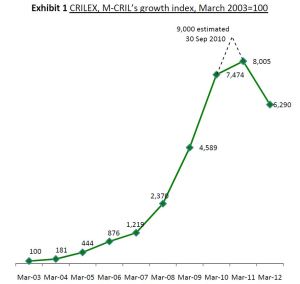You are currently browsing the tag archive for the ‘SKS’ tag.
It’s good to see microfinance researchers seriously studying alternatives to microloans or other microfinancial services. Very poor people need assets and a helping hand more than a loan, so why not hand out a cow or some other income-generating assets, offer training, and provide basic healthcare? That’s what an 18-month “Ultra-Poor Programme” run by SKS Microfinance in India did. But the randomised impact evaluation performed by Jonathan Morduch of New York University, Shamika Ravi of the Indian School of Business and Jonathan Bauchet of Purdue University on this programme turned up a “null” result, similar to those of randomised studies of microfinance.
Perhaps it is surprising to see SKS Microfinance (India’s largest microlender before 2010, and now perhaps most notorious microlender) giving non-repayable one-off kickstarts to ultra-poor households. But the intention of the programme was not purely altruistic; it was to “graduate” households into microfinance, by giving them assets to start a business.
In the programme in Andhra Pradesh evaluated by Morduch/Ravi/Bauchet, people who got a free asset and training to become microentrepreneurs were found to be no better off later than those who didn’t. They also didn’t manage to reduce their debts or increase their savings any more than others. Why? The authors believe it is
explained in large part by substitution with other economic activities. […] During the study period, wages in agricultural labor were rising steadily in the region, so that households in the control group were able to improve their economic conditions in parallel with households in the treatment group. (35)
The opportunities outside the self-employment programme offered similarly improving incomes as the opportunities offered by the programme itself. To what conclusion should this lead us about the concept of entrepreneurial self-lift out of poverty? Overall, the take-home message from the authors is eminently logical:
The Andhra Pradesh crisis has been something of a turning point in public assessment of microfinance, with a suicide wave caused by widespread overindebtedness badly tarnishing the sector’s image in India as well as abroad. Some Indian politicians are now beginning to identify the idea of alleviating poverty with microfinance as “crap“.
Source: M‐CRIL Microfinance Review 2012 (vii)
Microfinance in India remains in protracted decline since 2010 (see graph), although talk of “green shoots” and catharsis after “near-death experience” has been around for some time. The industry’s stance for the past two years has been to deny responsibility for any wrongdoings, downplay its role in precipitating the dozens of suicides, and claim that the AP government’s October 2010 legislation was a surprising and unjust crackdown on healthy practices. I have claimed otherwise.
Yet, fairly surprisingly, my new paper investigating the causes of the crisis, and a recent interview with SKS Microfinance senior managers come to some similar conclusions about the causes. In particular, both versions see the unregulated hyper-competitive market as a significant cause of the tragedy which led to microfinanciers’ troubles. How can this be?
Microfinance in India is still where it was months ago – in a stalemate with the government. The crisis of microcredit in the southern Indian state of Andhra Pradesh which began last October with a rash of client suicides – we were the first to blog about this, and followed its development throughout – climaxed in a standoff in late October between the state legislature and microfinance institutions (MFIs). Mud was thrown by both sides in an intense blame-game, while actually the crisis had systemic causes rooted in weak legislation and a hyper-competitive market.
Neither side has found a way to break out. But the stalemate is becoming unstable. It is increasingly clear to MFIs and their funders that most loans in Andhra Pradesh will not be recoverable, since trust in the MFIs’ promise of being “here to stay” is dwindling, and the new legislation has rendered erstwhile coercive recovery practices impossible. On the other hand, the Andhra government cannot step down from its legislature issued under the promise of protecting the poor without losing face, and the Indian federal government has chosen to largely ignore the issue.
The Economic Times from Mumbai recently provided a thorough update on what happened in the past few months, which I’m quoting here. The growing problem is that the MFIs in Andhra Pradesh will need new capital soon in order to replace the loans they have written off, or will soon be forced to write off. Read the rest of this entry »



